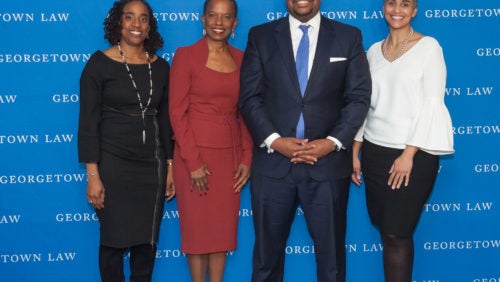Georgetown Law Associate Dean Henning, Other Experts Explore Race & Criminal Justice
February 13, 2018

Georgetown Law Associate Dean Kristin Henning, American Law Professor Angela Davis, George Washington Law Associate Dean Roger Fairfax and University of Maryland Law Professor Renee Hutchins explore race and criminal justice at Georgetown Law on Feb. 12.
Michael Brown. Eric Garner. Tamir Rice. Walter Scott. Freddie Gray. Sam DuBose. Alton Sterling. Philando Castile. Terence Crutcher.
“[These] are just some of the names on a long list of unarmed black boys and men who were killed by police officers in recent years,” said American University Law professor and book editor Angela Davis — reading from the introduction of Policing the Black Man: Arrest, Prosecution and Imprisonment (Knopf Doubleday, 2017). “Although black men have been victims of violence at the hands of the state since the time of slavery, technology and social media now permit us to literally bear witness to many of these killings repeatedly.”
The videos of the killings “serve as a reminder that the lives of black men and boys continue to be devalued and destroyed with impunity at the hands of the state,” Davis said — noting that none of the police officers who killed these unarmed men and boys have been convicted of a single crime (though one pled guilty to a civil rights violation).
“These killings are not just a part of African American history; they have continued well into the 21st century, almost 400 years after the beginning of slavery, and persist with remarkable frequency and brutality — during a time when America landed its first African American president,” Davis said.
When Davis was first asked to collect and edit this volume of essays on race and policing, she immediately said yes — and reached out to experts including Georgetown Law Associate Dean Kristin Henning. Henning and Davis were joined by University of Maryland Law Professor Renée Hutchins and George Washington University Associate Dean Roger Fairfax to discuss the book and their contributions to it at “Policing the Black Man: Intersections of Race and Criminal Justice” at Georgetown Law on the evening of February 12.
Henning, who directs the Law Center’s Juvenile Justice Clinic, discussed her essay on the role of policing and the socialization of black boys — pointing out that black boys are policed like no one else in society. The police killing of 12-year-old Tamir Rice, who was playing with a toy gun in a park, demonstrates the ways that black children are viewed as adults much earlier than their white peers. Solutions? We need to decriminalize normal adolescent behavior, Henning said, and rethink the need for police officers in schools — a need that grew out of school shootings by white youths but was transferred to black youths.
“Why are we arresting children for school fights, disorderly behavior, talking back to SROs, simple marijuana possession?…” Henning asked. “Can we hand the policing or school discipline back over to counselors and behavioral specialists, who are especially trained to deal with adolescent behavior?”
Corrosive effects
Hutchins discussed her essay on racial profiling — and reminded the audience why everyone in America should care. “I’m the mother of two kids who look to me like Tamir Rice, who look to me like Trayvon Martin,” Hutchins said. “I’m a mother who when she sends her kids out of the house every morning, shouldn’t have to worry about whether they are coming home….perhaps you are a young black man and you don’t want to walk out of the house and worry about not coming home.”
And the corrosive effects, Hutchins said, affect us all. “We cannot have a participatory democracy when a significant percentage of our population feels like a colony in a nation. That is just not the way democracy works.”
Fairfax, meanwhile, explored the grand jury in the context of police violence — when there are so few prosecutions in police killings of unarmed black men.
“I’m a black man who has been policed my whole life…I’ve had guns drawn on me…even now, as a criminal law professor and former prosecutor and defense attorney, I am still pulled over, often on pretext, and every time I have one of those encounters, I fear for my life…” he said. “My claim is that there needs to be an independent prosecuting authority in charge of every investigation and prosecution of a police officer, period.”
Commitment to justice
The event, designed to commemorate Black History Month, was sponsored by organizations including Georgetown University’s “Let Freedom Ring!” Initiative and Georgetown Law’s Office of Equity, Community and Inclusion; Juvenile Justice Clinic; Black Law Students Association; and Women of Color Collective. Imani Waweru (L’18) of BALSA and Ambur Smith (L’18) of the Collective played key roles.
“As a black man…I too have been stopped and frisked before; I too have been ushered inside a room on suspicion of shoplifting…I grew up middle class, and I’m at a fine institution such as Georgetown Law, so I do have privileges that many people in my community do not have,” Waweru said as he introduced the panel. “This issue is one that touches every class and especially affects the black community.”
Georgetown Law Dean William M. Treanor said that the issues raised by the book and the discussion continue to resonate as Georgetown grapples with and addresses its past with respect to the 1838 sale of 272 slaves. Today, Treanor said, “we are focusing on issues of race and justice, reflecting both our history and our commitment to inclusion and justice.”